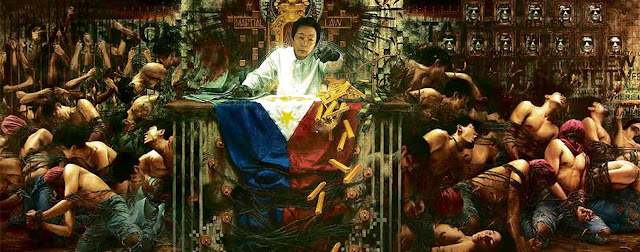"Salvaged Memories, Salvaged Lives"
At age 28, Randalf Dilla has created an 8' x 18.5' oil mural to help remind Filipinos of the dark side of the Martial Law years. Being only 28 years old, it is obvious that the artist has neither first hand knowledge nor experience of the Marcos regime. The painting therefore depicts only what Randalf has learned or heard from his own research. The dictator takes the central part of the mural with gold bars falling down in front. The Philippine flag appears to be used as a table cloth and portraits of military men cover part of the mural. But most of the canvass is really littered with images of victims of human rights abuses, hence, the work bears the title, "Salvaged Memories, Salvaged Lives".
 |
| Salvaged Memories, Salvaged Lives by Randalf Dilla (Hiraya Gallery) |
Rose de la Cruz writes in the Manila Bulletin "Remembering Martial Law and the Value of Freedom". Two paragraphs in the article describe how some in the Philippines nowadays regard the Martial Law years.
To those who like to see the “bright side” in dark days, the curfew was a good thing because it brought children and husbands home by midnight, and sort of offered a “safer” night with people not allowed to move around.
Many say people were most disciplined then, especially in traffic, because of the presence of uniformed men. The incidence of crime was low, again because of police visibility – and the possibility that one may “disappear” for a long time. Young adults, especially are awed when one tells them about the bus marshals who rode in the buses, ready to shoot holdup men.
It is disillusionment, a totally misguided nostalgia. What has happened and is happening in the Philippines is perhaps similar to what other countries have experienced after a period of authoritarian rule. Escaping from a dictator often does not translate automatically to a birth of a genuine democracy especially when one's eyes are fixed on the rear-view mirror of escaping authoritarianism, utterly failing to see what responsibilities democracy commands ahead.
I just happened to read a masteral thesis by Alinane R. Nasanja. Its abstract hits me especially when I hear clamor for the return of the iron fist.
..despite three multiparty elections since the 1990s, the government, which succeeded Banda, has failed to broaden the avenues for the consolidation of democracy in Malawi, leading to disillusionment among the people. Ten years of multiparty democracy have only resulted in the regression to the practices of the very regime it replaced. Currently Malawi is plagued with a lack of independent media, weak civil society, corruption among top government officials and a weak economy to mention a few. The thesis argues that this is because of the nature of the ruling class as well as the issue of ethnicity, which has resulted in the contestation of power."Sa ikauunlad ng bayan, disiplina ang kailangan" (For the country to progress, discipline is needed) I am at least relieved that Rose de la Cruz followed the two nostalgic remembering of Martial Law with this:
But that was not ‘discipline’ being practiced but fear for the authorities who had the power to detain you for any perceived fault – from jaywalking to subversion to illegal possession of firearms. Though that kind of atmosphere made one live in fear of being arrested, it also made people follow the rules.Martial Law must be remembered, but not for the wrong reasons. We should not remind ourselves of the past regime to hide the fact that we have not moved forward. Human rights abuses continue and so does large scale corruption. Likewise, we should not return simply because we have not found our way forward,
Comments
Post a Comment